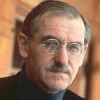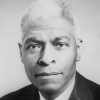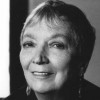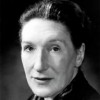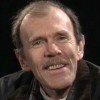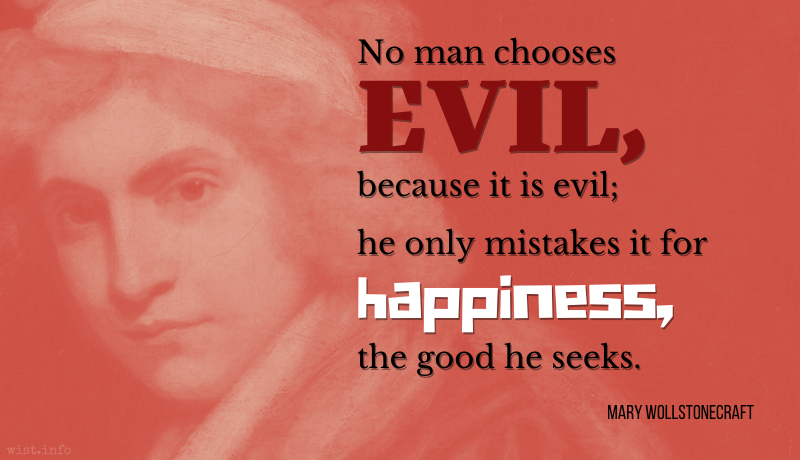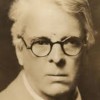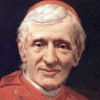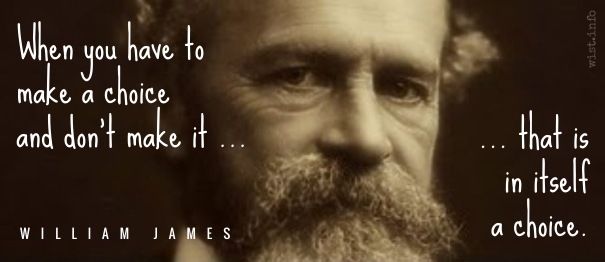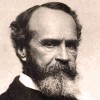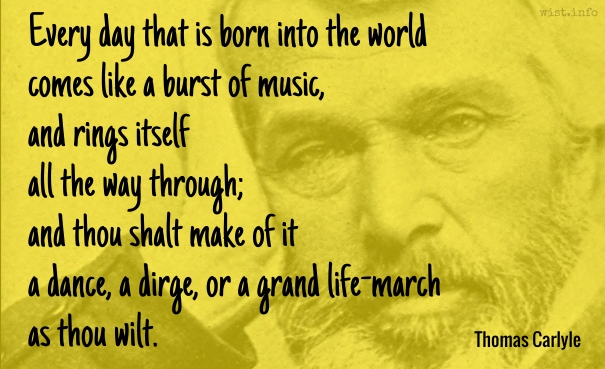Men will believe any thing at all, provided they are under no obligation to believe it.
Quotations about:
choice
Note not all quotations have been tagged, so Search may find additional quotes on this topic.
“If Mr. Darcy is neither by honour nor inclination confined to his cousin, why is not he to make another choice? And if I am that choice, why may not I accept him?”
“Because honour, decorum, prudence, nay, interest, forbid it. Yes, Miss Bennet, interest; for do not expect to be noticed by his family or friends, if you wilfully act against the inclinations of all. You will be censured, slighted, and despised, by everyone connected with him. Your alliance will be a disgrace; your name will never even be mentioned by any of us.”
“These are heavy misfortunes,” replied Elizabeth. “But the wife of Mr. Darcy must have such extraordinary sources of happiness necessarily attached to her situation, that she could, upon the whole, have no cause to repine.”Jane Austen (1775-1817) English author
Pride and Prejudice, ch. 56 [Elizabeth and Lady Catherine] (1813)
(Source)
If people knew the story of their lives how many would then elect to live them?
Cormac McCarthy (1933-2023) American novelist, playwright, screenwriter
The Crossing [Quijada] (1994)
(Source)
Often mis-cited to All the Pretty Horses (1992), the first part of the Border Trilogy (this is the second).
But one cannot weep for the entire world. It is beyond human strength. One must choose.
[On ne peut pleurer pour le monde entier : C’est au-delà des forces humaines. Il faut choisir!]
Jean Anouilh (1910-1987) French dramatist
Cecile; or The School for Fathers [L’Ecole Des Peres] [The Chevalier] (1951) [tr. Klein (1956)]
(Source)
People couldn’t become truly holy, he said, unless they also had the opportunity to be definitively wicked.
Terry Pratchett (1948-2015) English author
Good Omens, 2. “Eleven Years Ago” (1990) [with Neil Gaiman]
(Source)
I would rather go to hell by choice than to stumble into heaven by following the crowd.
Benjamin Mays (1894-1984) American minister, educator, civil rights leader
(Attributed)
Atoms in the laboratory are weird stuff, behaving like active agents rather than inert substances. They make unpredictable choices between alternative possibilities according to the laws of quantum mechanics. It appears that mind, as manifested by the capacity to make choices, is to some extent inherent in every atom.
Freeman Dyson (1923-2020) English-American theoretical physicist, mathematician, futurist
“Progress in Religion,” Templeton Prize acceptance speech, Washington National Cathedral (9 May 2000)
(Source)
Make your choice, adventurous Stranger,
Strike the bell and bide the danger,
Or wonder, till it drives you mad,
What would have followed if you had.C. S. Lewis (1898-1963) English writer, literary scholar, lay theologian [Clive Staples Lewis]
The Magician’s Nephew, ch. 4 “The Bell and the Hammer” (1955)
(Source)
Inscription below the bell in Charn.
HORTENSIO: There’s small choice in rotten apples.
William Shakespeare (1564-1616) English dramatist and poet
Taming of the Shrew, Act 1, sc. 1, l. 136 (1.1.136) (c. 1591))
(Source)
So much to win, so much to lose,
No marvel that I fear to choose.Letitia Elizabeth Landon (1802-1838) English poet and novelist [a/k/a L.E.L.]
“The Golden Violet” (1827)
(Source)
We think of forgiveness as a thing. An incident. A choice. But forgiveness is a process. A long, exhausting process. A series of choices that we have to make over, and over, and over again. Because the anger at having been wronged — the rage, the fury, the desire to lash out and cut back — doesn’t just vanish because you say to someone, “I forgive you.” Rather, forgiveness is an obligation you take on not to act punitively on your anger. To interrogate it when it arises, and accept that you have made the choice to be constructive rather than destructive. Not that you have made the choice never to be angry again.
Elizabeth Bear (b. 1971) American author [pseud. for Sarah Bear Elizabeth Wishnevsky]
Ancestral Night (2019)
(Source)
He is no wise man that will quit a certainty for an uncertainty.
Samuel Johnson (1709-1784) English writer, lexicographer, critic
The Idler, # 57 “The Character of Sophron” (19 May 1759)
(Source)
One of Sophron's (Wisdom's) maxims.
Better to sink beneath the shock
Than moulder piecemeal on the rock!
He that will not when he may,
When he will he shall have nay.Robert Burton (1577-1640) English scholar
Anatomy of Melancholy, Part 3, sec. 2, member 5, subsec. 5 (1621, 2nd ed.)
(Source)
But heard are the voices,
Heard are the sages,
The Worlds and the Ages:
“Choose well: your choice is
Brief, and yet endless.”[Doch rufen von drüben
Die Stimmen der Geister
Die Stimmen der Meister:
Bersäumt nich zu üben
Die Kräfte des Guten.]Johann Wolfgang von Goethe (1749-1832) German poet, statesman, scientist
“Symbolum” (1815) [tr. Carlyle (1843)]
(Source)
(Source (German)).
Carlyle's loose translation first appears in Past and Present, Book 2, ch. 17 "The Beginnings" (1843), then is expanded in a speech at the University of Edinburgh (2 Apr 1866), reprinted (with Goethe's original) in On the Choice of Books (1877).
"Choose well: your choice is brief and yet endless," is sometimes attributed to Ella Winter. She references it in an anecdote in And Not to Yield: An Autobiography (1963).
You make what seems a simple choice: choose a man or a job or a neighborhood — and what you have chosen is not a man or a job or a neighborhood, but a life.
But choice in any sphere is a peril, and the basic division of peoples is of those who believe in choice and those who mistrust it.
I think of all the choices I never knew. And those I let be made for me — to please, from fear, for love. Where did they disappear to, those choices that I never made? They are all part of who I am. They are the legacy I leave behind, they are the finished portrait of myself I cannot change.
It is our choices, Harry, that show what we truly are, far more than our abilities.
Joanne "Jo" Rowling (b. 1965) British novelist [writes as J. K. Rowling and Robert Galbraith]
Harry Potter and the Chamber of Secrets [Dumbledore] (1998)
(Source)
It is the ability to choose which makes us human.
Madeleine L'Engle (1918-2007) American writer
Walking on Water: Reflections on Faith and Art, ch. 2 (1980)
(Source)
We were entrusted to one another, in the days which mattered, Clare thought. Entrusted to one another by chance, not choice. Chance, and its agents time and place. Chance is better than choice; it is more lordly. In its carelessness it is more lordly. Chance is God, choice is man. You — she thought, looking at the bed — chanced not chose to want us again.
Elizabeth Bowen (1899-1973) Irish author
The Little Girls, ch. 7 (1964)
(Source)
Quoted, in abbreviated form, in the foreword to her Pictures and Conversations (1975):
Chance is better than choice; it is more lordly. Chance is God, choice is man.
You choose, you live the consequences. Every yes, no, maybe, creates the school you call your personal experience.
You should always choose the lesser of two evils.
[De duobus malis semper minus tamen est eligendum.]
Thomas à Kempis (c. 1380-1471) German-Dutch priest, author
The Imitation of Christ [De Imitatione Christi], Book 3, ch. 12, v. 2 (3.12.2) (c. 1418-27) [tr. Knox-Oakley (1959)]
(Source)
In this context, Thomas is speaking of the evil (suffering) of resisting temptation and losing out on fun times in this world, compared to the evil of eternal damnation, e.g.,
If thou say, that thou art not able to suffer much, how then wilt thou endure the fire hereafter? Of two evils the less is always to be chosen. That thou mayest therefore avoid the everlasting punishment, endeavour to endure present evils patiently for God's sake. [Anon. (1901)]
See also Cicero.
(Source (Latin)). Alternate translations:
Of two evils, the less evil is to be taken.
[tr. Whitford/Raynal (1530/1871)]
Of two evils, the lesser is to be chosen.
[tr. Whitford/Gardiner (1530/1955)]
Of two evils the lesse is alwaies to be chosen.
[tr. Page (1639), 3.12.5]
Nature, as well as Religion, teaches Men, of Two Evils to choose the less.
[tr. Stanhope (1696; 1706 ed.), 3.13]
Of two evils, the least is to be chosen.
[tr. Payne (1803), 3.9.4]
Of two evils the less is alway to be chosen.
[ed. Parker (1841)]
Of two evils, the least is to be chosen.
[tr. Dibdin (1851), 3.10.1]
Of two evils we ought always to choose the less.
[ed. Bagster (1860)]
Of two evils we should always choose the less.
[tr. Benham (1874)]
Of two evils the less is always to be chosen.
[tr. Anon. (1901)]
Of two evils, the lesser is always to be chosen.
[tr. Croft/Bolton (1940)]
Of two evils always choose the less.
[tr. Daplyn (1952)]
Of two evils, always choose the lesser.
[tr. Sherley-Price (1952)]
One must always choose the lesser of two evils.
[tr. Knott (1962)]
You must always choose the lesser of two evils.
[tr. Rooney (1979)]
Always choose the lesser of two evils.
[tr. Creasy (1989)]
But I have learned from philosophers that among evils one ought not only to choose the least, but also to extract even from these any element of good that they may contain.
[Sed quia sic ab hominibus doctis accepimus, non solum ex malis eligere minima oportere, sed etiam excerpere ex his ipsis, si quid inesset boni ….]
Marcus Tullius Cicero (106-43 BC) Roman orator, statesman, philosopher
De Officiis [On Duties; On Moral Duty; The Offices], Book 3, ch. 1 (3.1) / sec. 3 (44 BC) [tr. Miller (1913)]
(Source)
(Source (Latin)). Alternate translation:
This is given us for a rule by the learned, that when several evils are threatening us at once, we should not only choose to undergo the least, but extract some advantage out of them, if it be possible.
[tr. Cockman (1699)]
We have been taught by learned men, not only that we ought to choose the least of evils, but also to extract from them, whatever good they contain.
[tr. McCartney (1798)]
We have bene taught by learned men, that out of evils it is fit not only to choose the least, but also from those very evils to gather whatever good is in them.
[tr. Edmonds (1865)]
Philosophers say that one ought not only of evils to choose the least, but from even these least evils to extract whatever of good there may be in them.
[tr. Peabody (1883)]
Having been taught by philosophers not only to choose the lesser evil but even to extract whatever good is in it.
[tr. Gardiner (1899)]
Learned men have taught us that not only with a choice of evils we should choose the least, but that from the evil we should endeavor to extract some good.
[Harbottle, Dictionary of Quotations (Classical) (1906 ed.)]
Philosophers have taught me not only that one ought to choose the lesser evils but also that even from them one ought to gather whatever good they might contain.
[tr. Edinger (1974)]
See also Thomas à Kempis.
No doubt about it, solitude is improved by being voluntary.
Barbara Holland (1933-2010) American author
One’s Company: Reflections on Living Alone (1996)
(Source)
It may be confidently asserted that no man chooses evil, because it is evil; he only mistakes it for happiness, the good he seeks.
Mary Wollstonecraft (1759-1797) English social philosopher, feminist, writer
A Vindication of the Rights of Men (1790)
(Source)
He is free to make the wrong choice, but not free to succeed with it. He is free to evade reality, he is free to unfocus his mind and stumble blindly down any road he pleases, but not free to avoid the abyss he refuses to see. Knowledge, for any conscious organism, is the means of survival; to a living consciousness, every “is” implies an “ought.” Man is free to choose not to be conscious, but not free to escape the penalty of unconsciousness: destruction. Man is the only living species that has the power to act as his own destroyer — and that is the way he has acted through most of his history.
Ayn Rand (1905-1982) Russian-American writer, philosopher
“The Objectivist Ethics,” University of Wisconsin Symposium on “Ethics in Our Time” (9 Feb 1961)
(Source)
Character is that which reveals moral purpose, showing what kind of things a man chooses or avoid.
[ἔστιν δὲ ἦθος μὲν τὸ τοιοῦτον ὃ δηλοῖ τὴν προαίρεσιν, ὁποία τις ἐν οἷς οὐκ ἔστι δῆλον ἢ προαιρεῖται ἢ φεύγει διόπερ οὐκ ἔχουσιν ἦθος τῶν λόγων ἐν οἷς μηδ᾽ ὅλως ἔστιν ὅ τι προαιρεῖται ἢ φεύγει ὁ λέγων.]
Aristotle (384-322 BC) Greek philosopher
Poetics [Περὶ ποιητικῆς, De Poetica], ch. 6, sec. 17 / 1450b.9 (c. 335 BC) [tr. Butcher (1895)]
(Source)
Original Greek. The key word êthos [ἦθος] is generally given here as "character." Alternate translations:
- "Character in a play is that which reveals the moral purpose of the agents, i.e. the sort of thing they seek or avoid, where that is not obvious." [tr. Bywater (1909)]
- "Psychology in the sense of "an index to the quality of the purpose" has for its sphere places where the ulterior purposes of an immediate resolve (positive or negative) is naturally obscure." [tr. Margoliouth (1911)]
- "Character is that which reveals choice, shows what sort of thing a man chooses or avoids in circumstances where the choice is not obvious." [tr. Fyfe (1932)]
- "Character is that which reveals decision, of whatever sort." [tr. Janko (1987), sec. 3.1.3]
- "Moral character is what reveals the nature of people's fundamental options." [tr. Kenny (2013)]
A Reverend Donald Wildmon in Mississippi heard something on the radio that he didn’t like. Well, Reverend, did anyone ever tell you there are two knobs on the radio? Two. Knobs. On the radio. Of course, I’m sure the reverend isn’t that comfortable with anything that has two knobs on it … But hey, Reverend, there are two knobs on the radio! One of them turns the radio off, and the other one changes the station! Imagine that, Reverend, you can actually change the station! It’s called freedom of choice, and it’s one of the principles this country was founded upon. Look it up in the library, Reverend, if you have any of them left when you’ve finished burning all the books.
“This I choose to do,” she croaked, her breath leaving little clouds in the air. She cleared her throat and started again. “This I choose to do. If there is a price, this I choose to pay. If it is my death, then I choose to die. Where this takes me, there I choose to go. I choose. This I choose to do.”
It wasn’t a spell, except in her own head, but if you couldn’t make spells work in your own head, you couldn’t make them work at all.
In their moral justification, the argument of the lesser evil has played a prominent role. If you are confronted with two evils, thus the argument runs, it is your duty to opt for the lesser one, whereas it is irresponsible to refuse to choose altogether. […] Politically, the weakness of the argument has always been that those who choose the lesser evil forget very quickly that they chose evil.
Hannah Arendt (1906-1975) German-American philosopher, political theorist
“Personal Responsibility Under Dictatorship” (1964)
(Source)
The intellect of man is forced to choose
Perfection of the life or of the work.
Another point of disagreement is not factual but involves the ethical/moral principle […] sometimes referred to as the “politics of moral witness.” Generally associated with the religious left, secular leftists implicitly invoke it when they reject LEV on the grounds that “a lesser of two evils is still evil.” Leaving aside the obvious rejoinder that this is exactly the point of lesser evil voting — i.e. to do less evil, what needs to be challenged is the assumption that voting should be seen a form of individual self-expression rather than as an act to be judged on its likely consequences. […] The basic moral principle at stake is simple: not only must we take responsibility for our actions, but the consequences of our actions for others are a far more important consideration than feeling good about ourselves.
Noam Chomsky (b. 1928) American linguist and activist
“An Eight Point Brief for LEV (Lesser Evil Voting)” (15 Jun 2016) [with John Halle]
(Source)
We can believe what we choose. We are answerable for what we choose to believe.
John Henry Newman (1801-1890) English prelate, Catholic Cardinal, theologian
Letter to Mrs. William Froude (27 Jun 1848)
(Source)
In C. S. Dessain (ed.), Letters and Diaries of John Henry Newman, vol. 12 "Rome to Birmingham" (1961).
It is worse than useless to try to put down by law a practice which a very large number of people believes to be innocent, and which must be left to the taste and conscience of the individual.
William Ralph Inge (1860-1954) English prelate [Dean Inge]
“The Birth-Rate” (1917), Outspoken Essays: First Series (1919)
(Source)
Speaking of birth control.
Marriage is not a noun, it’s a verb. It’s not something you have, like a house or a car. It is not a piece of paper that proves you are husband and wife. Marriage is a behavior. It is a choice you make over and over again, reflected in the way you treat your partner every day.
Barbara De Angelis (b. 1951) American relationship consultant, lecturer, author
Ask Barbara: The 100 Most-Asked Questions About Love, Sex, and Relationships (1997)
(Source)
This is the affirmation on which democracy rests … [W]e can all be responsible … We become what we do. So does the world we live in, if enough of us do it — whether “it” be good or detestable. This is the burden of freedom: that it is all our fault or our credit.
It’s important to be kind. You can’t know all the times that you’ve hurt people in tiny, significant ways. It’s easy to be cruel without meaning to be. There’s nothing you can do about that. But you can choose to be kind. Be kind.
Every day that is born into the world comes like a burst of music, and rings itself all the way through; and thou shalt make of it a dance, a dirge, or a grand life-march as thou wilt.
Thomas Carlyle (1795-1881) Scottish essayist and historian
(Attributed)
Variant: "Every day that is born into the world comes like a burst of music and rings itself the way through, and you make of it a dance, a dirge, or a life-march, as thou wilt."
The earliest reference I can find to this is its quotation in (or perhaps adjacent to) Kate W. Hamilton, "Ariel Seaton's Rainy Day," The Ladies' Repository (Jan 1868).
There isn’t a way things should be. There’s just what happens, and what we do.
Cleverness is a gift, kindness is a choice. Gifts are easy — they’re given after all. Choices can be hard. You can seduce yourself with your gifts if you’re not careful, and if you do, it’ll probably be to the detriment of your choices.
Jeff Bezos (b. 1964) American business magnate, entrepreneur, investor
Commencement Speech, Princeton University (2010)
(Source)
From the dissensions among Sects themselves arise necessarily a right of choosing and necessity of deliberating to which we will conform. But if we choose for ourselves, we must allow others to choose also, and so reciprocally, this establishes religious liberty.
Thomas Jefferson (1743-1826) American political philosopher, polymath, statesman, US President (1801-09)
“Notes on Religion” (1776-10?)
(Source)
Labeled by Jefferson "Scraps Early in the Revolution." Modern rendering. Original:
From the dissensions among sects themselves arises necessarily a right of chusing & necessity of deliberating to which we will conform, but if we chuse for ourselves, we must allow others to chuse also, & to reciprocally. This establishes religious liberty.
Virtue, then, is a state involving rational choice, consisting in a mean relative to us and determined by reason — the reason, that is, by reference to which the practically wise person would determine it. It is a mean between two vices, one of excess, the other of deficiency. It is a mean also in that some vices fall short of what is right in feelings and actions, and others exceed it, while virtue both attains and chooses the mean.
[ἔστιν ἄρα ἡ ἀρετὴ ἕξις προαιρετική, ἐν μεσότητι οὖσα τῇ πρὸς ἡμᾶς, ὡρισμένῃ λόγῳ καὶ ᾧ ἂν ὁ φρόνιμος ὁρίσειεν. μεσότης δὲ δύο κακιῶν, τῆς μὲν καθ᾽ ὑπερβολὴν τῆς δὲ κατ᾽ ἔλλειψιν: καὶ ἔτι τῷ τὰς μὲν ἐλλείπειν τὰς δ᾽ ὑπερβάλλειν τοῦ δέοντος ἔν τε τοῖς πάθεσι καὶ ἐν ταῖς πράξεσι, τὴν δ᾽ ἀρετὴν τὸ μέσον καὶ εὑρίσκειν καὶ αἱρεῖσθαι.]
Aristotle (384-322 BC) Greek philosopher
Nicomachean Ethics [Ἠθικὰ Νικομάχεια], Book 2, ch. 5 (2.6.15-16) / 1106b.35 (c. 325 BC) [tr. Crisp (2000)]
(Source)
(Source (Greek)). Alternate translations:
Virtue then is “a state apt to exercise deliberate choice, being in the relative mean, determined by reason, and as the man of practical wisdom would determine.” It is a middle state between too faulty ones, in the way of excess on one side and of defect on the other: and it is so moreover, because the faulty states on one side fall short of, and those on the other exceed, what is right, both in the case of the feelings and the actions; but Virtue finds, and when found adopts, the mean.
[tr. Chase (1847)]
Moral virtue, then, is a certain formed state, or habit of purpose, which conforms to the relative mean in action, and which is determined to that mean by reason, or as the prudent man would determine it. And it is the mean between two vices, one of which consists in excess, and the other in defect. So that vices sometimes fall short of what is right in our emotions and in our actions, and sometimes exceed it, while virtue fines the mean and chooses it.
[tr. Williams (1869)]
Virtue then is a state of deliberate moral purpose consisting in a mean that is relative to ourselves, the mean being determined by reason, or as a prudent man would determine it. It is a mean state firstly as lying between two vices, the vice of excess on the one hand, and the vice of deficiency on the other, and secondly because, whereas vices either fall short of or go beyond what is proper in the emotions and actions, virtue not only discovers but embraces the mean.
[tr. Welldon (1892)]
Virtue, then, is a habit or trained faculty of choice, the characteristic of which lies in moderation or observance of the mean relatively to the persons concerned, as determined by reason, i.e. by the reason by which the prudent man would determine it. And it is a moderation, firstly, inasmuch as it comes in the middle or mean between two vices, one on the side of excess, the other on the side of defect; and, secondly, inasmuch as, while these vices fall short of or exceed the due measure in feeling and in action, it finds and chooses the mean, middling, or moderate amount.
[tr. Peters (1893)]
Virtue, then, is a state of character concerned with choice, lying in a mean, i.e. the mean relative to us, this being determined by a rational principle, and by that principle by which the man of practical wisdom would determine it. Now it is a mean between two vices, that which depends on excess and that which depends on defect; and again it is a mean because the vices respectively fall short of or exceed what is right in both passions and actions, while virtue both finds and chooses that which is intermediate.
[tr. Ross (1908)]
Virtue then is a settled disposition of the mind determining the choice of actions and emotions, consisting essentially in the observance of the mean relative to us, this being determined by principle, that is, as the prudent man would determine it. And it is a mean state between two vices, one of excess and one of defect. Furthermore, it is a mean state in that whereas the vices either fall short of or exceed what is right in feelings and in actions, virtue ascertains and adopts the mean.
[tr. Rackham (1934)]
Virtue, then, is a deliberately choosing state, which is in a medial condition in relation to us, one defined by a reason and the one by which a practically-wise person would define it. Also, it is a medial condition between two vices, one of excess and the other of deficiency. Further, it is also such a condition because some vices are deficient in relation to what the relevant feelings and actions should be and other are excessive, but virtue both finds the mean and chooses it.
[tr. Reeve (1948)]
[Ethical] virtue, then, is a habit, disposed toward action by deliberate choice, being at the mean relative to us, and defined by reason and as a prudent man would define it. It is a mean between two vices, one by excess and the other by deficiency; and while some of the vices exceed while the others are deficient in what is right in feelings and actions, virtue finds and chooses the mean.
[tr. Apostle (1975)]
So virtue is a purposive disposition, lying in a mean that is relative to us and determined by a rational principle, and by that which a prudent man would use to determine it. It is a mean between two kinds of vice, one of excess and the other of deficiency; and also for this reason, that whereas these vices fall short of or exceed the right measure in both feelings and actions, virtue discovers the mean and chooses it.
[tr. Thomson/Tredennick (1976)]
Virtue, therefore, is a characteristic marked by choice, residing in the mean relative to us, a characteristic defined by reason and as the prudent person would define it. Virtue is also a mean with respect to two vices, the one vice related to excess, the other to deficiency; and further, it is a mean because some vices fall short of and others exceed what should be the case in both passions and actions, whereas virtue discovers and chooses the middle term.
[tr. Bartlett/Collins (2011)]
Honour and profit lie not in one sacke.
George Herbert (1593-1633) Welsh priest, orator, poet.
Jacula Prudentum, or Outlandish Proverbs, Sentences, &c. (compiler), # 232 (1640 ed.)
(Source)




